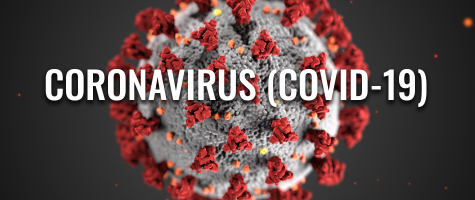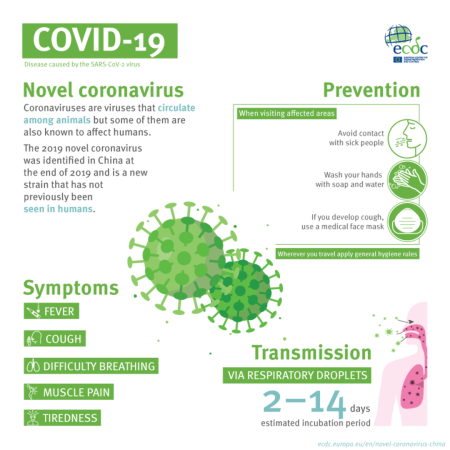April Health Talk Blog
APRIL BLOG
Coronavirus (COVID-19)
Viral infections are caused by a virus. There have only been 5,000 types identified. Viruses contain a small piece of genetic code and are protected by a coat of protein and fat.
Viruses invade a host and attach themselves to a cell. As they enter the cell, they release genetic material which forces the cell to replicate and the virus multiplies. When the cell dies, it releases new viruses and these go on to infect new cells. Not all viruses destroy their host cell.
Antiviral medications help in some cases and can either prevent the virus from reproducing or boost the host’s immune system. Antibiotics are not effective against viruses, will not stop the virus and it increases the risk of antibiotic resistance. Most treatments aim to relieve symptoms while the immune system combats the virus without assistance from medicine.
What is a coronavirus OR COVID 19?
Coronavirus disease 2019, or COVID-19, is a kind of common virus that can cause respiratory tract infection. It can affect your upper respiratory tract - sinuses, nose, throat or lower respiratory tract, windpipe and lungs. Most coronaviruses aren't dangerous.
The CDC is now closely monitoring the outbreak caused by Coronavirus Disease 2019, COVID-19, first identified in Wuhan City, Hubei Province, China. Officials named this new virus severe acute respiratory syndrome coronavirus 2, SARS-CoV-2. This is the virus that causes COVID-19.
The COVID-19 outbreak quickly spread around the world. It spreads the same way other coronaviruses do, mainly person-to-person contact, leading the World Health Organization (WHO) to declare this as a pandemic. Infections range from mild to serious.
Over the last 70 years, scientists have found that coronaviruses infect mice, rats, dogs, cats, turkeys, horses, pigs and cattle. Sometimes, these animals transmit coronaviruses to humans. The first people with COVID-19 had links to an animal and seafood market, suggesting animals initially transmitted the virus to humans. However, people with a more recent diagnosis had no connections with or exposure to the market, confirming that humans pass the virus to each other.
Who is at a higher risk for severe illness
There is limited information regarding risk factors for COVID-19, as it is a new and severe disease. Based on current information, older adults and people of any age who have serious underlying medical conditions might be at higher risk. Those at high-risk include:
- Pregnant women
- Age 65 years and older
- Those in a nursing home or long-term care facility
- High-risk conditions:
- chronic lung disease or moderate to severe asthma
- heart disease with complications
- immunocompromised including cancer treatment
- any age with severe obesity or certain underlying medical conditions, if not well controlled - diabetes, renal failure, or liver disease.
- Many conditions can cause immune-compromise including cancer treatment, bone marrow or organ transplantation, immune deficiencies, poorly controlled HIV or AIDS and prolonged use of corticosteroids and other immune weakening medications
There is no vaccine currently available for COVID-19. Scientists cannot easily cultivate and replicate the human coronaviruses in the laboratory, unlike the rhinovirus - the common cold. This could allow for early detection and treatment in people who have the virus but are not yet showing symptoms.
How Fast Is It Spreading?
The number of people infected by SARS-CoV-2 changes every day. As of March 23, more than 340,000 people have contracted the virus worldwide, causing over 14,000 deaths. According to the CDC, children are not at higher risk for COVID-19 than adults. 8 out of 10 deaths reported in the U.S. have been in adults 65 years old and older!
Among reported confirmed adults in the U.S.:
- Estimated percent requiring hospitalization
- 31-70% of adults 85 years old and older
- 31-59% of adults 65-84 years old
- Estimated percent requiring admission to intensive care unit
- 6-29% of adults 85 years old and older
- 11-31% of adults 65-84 years old
- Estimated percent who died
- 10-27% of adults 85 years old and older
- 4-11% of adults 65-84 years old
Is it COVID-19, a Cold or the Flu?
Call your doctor if you think you have been exposed to COVID-19 and develop a fever and symptom, or call your healthcare provider for medical advice. Your doctor will suspect
COVID-19 if you have:
- a fever and breathing problems
- traveled to places where the virus has spread.
- been exposed to people who have the virus within the last 14 days.
General symptoms of coronaviruses
A doctor can diagnose the virus responsible by taking a sample of respiratory fluids, such as mucus from the nose, or blood. Symptoms can be similar to a bad cold or the flu. Symptoms may appear 2-14 days after exposure, based on the incubation period of MERS-CoV viruses, but symptoms vary from person-to-person and can be fatal. Symptoms may include:
- sneezing
- runny nose
- fatigue
- dry cough
- fever
- sore throat
- exacerbated asthma
The virus can lead to pneumonia, respiratory failure, septic shock, and death. If you notice these severe symptoms in yourself or a loved one, get medical attention right away:
- Trouble breathing or shortness of breath
- Ongoing chest pain or pressure
- New confusion
- Can’t wake up
- Bluish lips or face
The Immune System
The immune system is a complex interaction involving different organs, structures and substances, such as white blood cells, bone marrow, lymphatic vessels and organs and specialized cells found in body tissues. White blood cells are the first line of defense!
The immune system fights off disease causing microorganisms and engineers the healing process. The immune system is vital to fighting every assault on the body! Understanding the role the immune systems plays in overall health will provide you the ability to take responsibility for your own health.
The responsibility of the immune system is to learn and identify those things that naturally belong in the body and those foreign or harmful through two basic means:
- cell mediated immunity – white blood cells or T lymphocytes, T-cells, identify and neutralize or destroy the foreign material.
- humoral immunity – antibody production. These are not cells but special proteins which damage invasive cells or alert white blood cells to attack the foreign body.
The Best Immune Boosters
- Sovereign Silver - Colloidal Silver - is a solution of microscopic silver atoms suspended in a liquid solution. Colloidal silver can kill certain germs by binding to and destroying proteins. It has been shown in studies to be antimicrobial and antibacterial. It doesn’t disrupt the body’s balance of good bacteria or microflora. It is totally safe to take on short term basis - especially for an immune system boost. Sovereign Silver checks all of these boxes for purity and bioavailability
- Echinacea - is well known for its
ability to support the immune system especially during the colder months. For years doctors and herbalists in Europe have commonly suggested Echinacea to support
immune health. Echinacea appears to activate chemicals in the body's immune system that decrease inflammation, which might reduce cold and flu symptoms.
- Elderberry - affects the immune system. Elderberry promotes activity against viruses including the flu and might reduce inflammation. It has very high concentrations of a few immune supporting compounds like vitamin C and antioxidants.
- Probiotics - Not all bacteria is bad! 70-80% of your immune system resides in the digestive tract. Probiotics help to populate your gut with good microflora that not only help with digestion but also support the immune system.
When taking probiotics for an immune boost, get one with a variety of Lactobacillus and Bifidobacterium strains and a high concentration of CFUs, colony forming units – this is the amount of live microorganisms that help to populate the gut.
- Zinc - is a mineral or an "essential trace element," because very small amounts of zinc are necessary for human health. The human body does not store excess zinc it must be consumed regularly as part of the diet. It is found in several systems and biological reactions, and it is needed for immune function, wound healing, blood clotting, thyroid function and much more. Zinc might have effects against viruses. It appears to lessen symptoms of the rhinovirus, common cold, but researchers can’t yet explain exactly how this works.
- Vitamin C – the single most important antioxidant for the immune system. It is essential for the formation on adrenal hormones and lymphocytes. It also has a direct effect on bacteria and viruses
- Coenzyme Q10 – Supports the immune system, an oxygen enhancer to protect the cells and heart function.
- Garlic – stimulates the immune system
- Kelp – supplies a balance of minerals needed for immune integrity
- Maitake, Reishi or Shitake extracts – build immunity and fight viral infections and cancer
- Grape Seed extract – one of the most potent antioxidants, protects cells
- Oregonal – helps digestion by increasing bile flow and fighting against some bacteria, viruses, fungi, intestinal worms and other parasites. Research published in the International Journal of Food Microbiology found that oil of oregano is an excellent germicide capable of killing a wide range of fungi and bacteria.
- Bayberry, Fenugreek, Hawthorn, Horehound, Licorice Root and Red Clover enhance the immune system.
- Power Greens – “a glass a day!” Should include spirulina, kelp, chlorophyll and made from:
- Natural ingredients
- High veggie to lower fruit ratio
- Complete vegetable blend
- Vitamins and minerals
- Low in sodium and sugars
- Includes probiotics
- Includes super mushrooms
What can you do to protect yourself?
If you have a serious underlying medical condition:
- Stay home if possible.
- Wash your hands often with soap and water or clean them with an alcohol-based sanitizer. This kills viruses on your hands.
- Practice social distancing - you can have and spread the virus without knowing it. If you do have to go out, stay at least 6 feet away from others.
- Don’t touch your face - Coronaviruses can live on surfaces from minutes to several hours dependent on the surface. If they get on your hands and you touch your eyes, nose, or mouth, they can get into your body.
- Clean and disinfect frequently touched services.
- Avoid all cruise travel and non-essential air travel.
- Call your healthcare professional if you have concerns about COVID-19 and your underlying condition or if you are sick.
- For more information on steps you can take to protect yourself, see CDC’s How to Protect Yourself
There’s no need to wear a face mask unless your doctor tells you to. If out in open spaces and adhering to the 6 foot distancing, it is unnecessary to wear a mask! I saw a guy walking down the street with an M-95 respirator on. Streets were deserted. Who can contaminate you??? The virus can survive for different periods of time on different type surfaces, but its trajectory is approximately 5 feet! Right now, supplies should be saved until needed, if exposed to SARS-CoV-2, have COVID-19, a health care worker or caring for someone who has it.
Stress and coping
How you respond to the outbreak can depend on your background, things that make you different from others and the community you live in. Fear and anxiety about a disease can be overwhelming and cause strong emotions in adults and children. Older adults are at higher risk of COVID-19 and may result in increased stress during a crisis. Fear and anxiety about the pandemic can be overwhelming and cause strong emotions.
Taking care of yourself, your friends, and your family can help you cope with stress. Helping others cope with their stress can also make your community stronger. Things you can do to support yourself:
- Take breaks from watching, reading, or listening to news stories and social media. Hearing about the pandemic repeatedly can be irritating.
- Take care of your body. Take deep breaths, stretch, or meditate. Try to eat healthy, well-balanced meals, exercise regularly, get plenty of sleep, and avoid alcohol and drugs.
- Make time to unwind. Try to do some other activities you enjoy.
- Connect with others. Talk with people you trust about your concerns and how you are feeling.
- Call your healthcare provider if stress gets in the way of your daily activities for several days in a row.
- If you, or someone you care about, are feeling overwhelmed with emotions like sadness, depression, or anxiety, or feel like you want to harm yourself or others call:
- 911
- Substance Abuse and Mental Health Services Administration’s (SAMHSA’s) Disaster Distress Helpline: 1-800-985-5990 or
- text TalkWithUs to 66746. (TTY 1-800-846-8517)
Stress factors can include:
- Fear and worry about your own health and the health of your loved ones
- Changes in sleep or eating patterns
- Difficulty sleeping or concentrating
- Worsening of chronic health problems
- Increased use of alcohol, tobacco, or other drugs
The individuals with preexisting mental health conditions should continue with their treatment and be aware of new or worsening symptoms. Additional information can be found at the Substance Abuse and Mental Health Services Administration (SAMHSAexternal icon) website.
Not all children and teens respond to stress in the same way. Some common changes to watch for include:
- Excessive crying or irritation in younger children
- Returning to behaviors they have outgrown - toilet accidents or bedwetting
- Excessive worry or sadness
- Unhealthy eating or sleeping habits
- Irritability and “acting out” behaviors in teens
- Difficulty with attention and concentration
- Avoidance of activities enjoyed in the past
- Unexplained headaches or body pain
- Use of alcohol, tobacco, or other drugs
How do you support your child?
- Take time to talk about the COVID-19 outbreak. Answer questions and share facts about COVID-19 in a way that your child or teen can understand.
- Reassure your child or teen that they are safe. Share how you deal with your own stress so that they can learn how to cope from you.
- Limit exposure to news coverage of the event, including social media. Children often misinterpret what they
- Try to keep up with regular routines. If schools are closed, create a schedule for learning activities and relaxing or fun activities.
- Be a role model. Take breaks, get plenty of sleep, exercise, and eat well. Connect with your friends and family members.
For first responders
Responding to COVID-19 can take an emotional toll on you. There are things you can do to reduce secondary traumatic stress (STS) reactions:
- Acknowledge that STS can impact anyone after a traumatic event.
- Learn the symptoms including physical - fatigue, illness and mental - fear, withdrawal, guilt.
- Allow time for you and your family to recover from responding to incidents
- Create personal self-care activities you enjoy - time with friends and family, exercising, or reading a book.
- Take a break from media coverage of COVID-19.
- Ask for help if you feel overwhelmed or concerned that COVID-19 is affecting your ability to care for your family and patients as you did before the outbreak.
- Learn more tips for taking care of yourself during emergency response.
For people who have been released from quarantine
Being separated from others if you may have been exposed to COVID-19 can be stressful, even if you do not get sick. Everyone feels differently after coming out of quarantine. Some feelings include:
- Mixed emotions, including relief after quarantine
- Fear and worry about your own health and the health of your loved ones
- Stress from the experience of monitoring yourself or being monitored by others for signs and symptoms
- Sadness, anger, or frustration because friends or loved ones have unfounded fears of contracting the disease from contact with you, even though you have been determined not to be contagious
- Other emotional or mental health changes
What Else Can I Do????
Treatments include self-care and over-the-counter (OTC) medication. People can take several steps, including:
- rest and avoid overexertion
- drink plenty of water – flushing the body!
- avoid smoking and smoky areas
Here is a list of sites for more information:
- chat icon
- Coronavirus Self-Checker
- A guide to help you make decisions and seek appropriate medical care
ALWAYS CONSULT YOUR PERSONAL HEALTH CARE PROFESSIONAL
- Prescription for Nutritional Healing, Fifth Edition, Phyllis A. Balch, CNC
- https://www.cdc.gov/coronavirus/2019-ncov/index.html
- https://www.webmd.com/lung/qa/what-is-a-coronavirus
- https://www.medicalnewstoday.com/articles/256521
- https://www.cdc.gov/coronavirus/2019-ncov/specific-groups/high-risk-complications/older-adults.html
- https://www.cdc.gov/coronavirus/2019-ncov/prepare/managing-stress-anxiety.html
- https://www.medicalnewstoday.com/articles/256521#types
- https://www.cdc.gov/coronavirus/2019-ncov/symptoms-testing/index.html
- https://www.webmd.com/lung/coronavirus#1
- https://www.webmd.com/lung/what-is-covid-19#1
- https://www.medicalnewstoday.com/articles/196271#causes
- https://healyeatsreal.com/supplements-boost-immune-system/
- https://www.webmd.com/vitamins/ai/ingredientmono-981/echinacea
- https://healyeatsreal.com/supplements-boost-immune-system/
- https://www.webmd.com/vitamins/ai/ingredientmono-982/zinc





